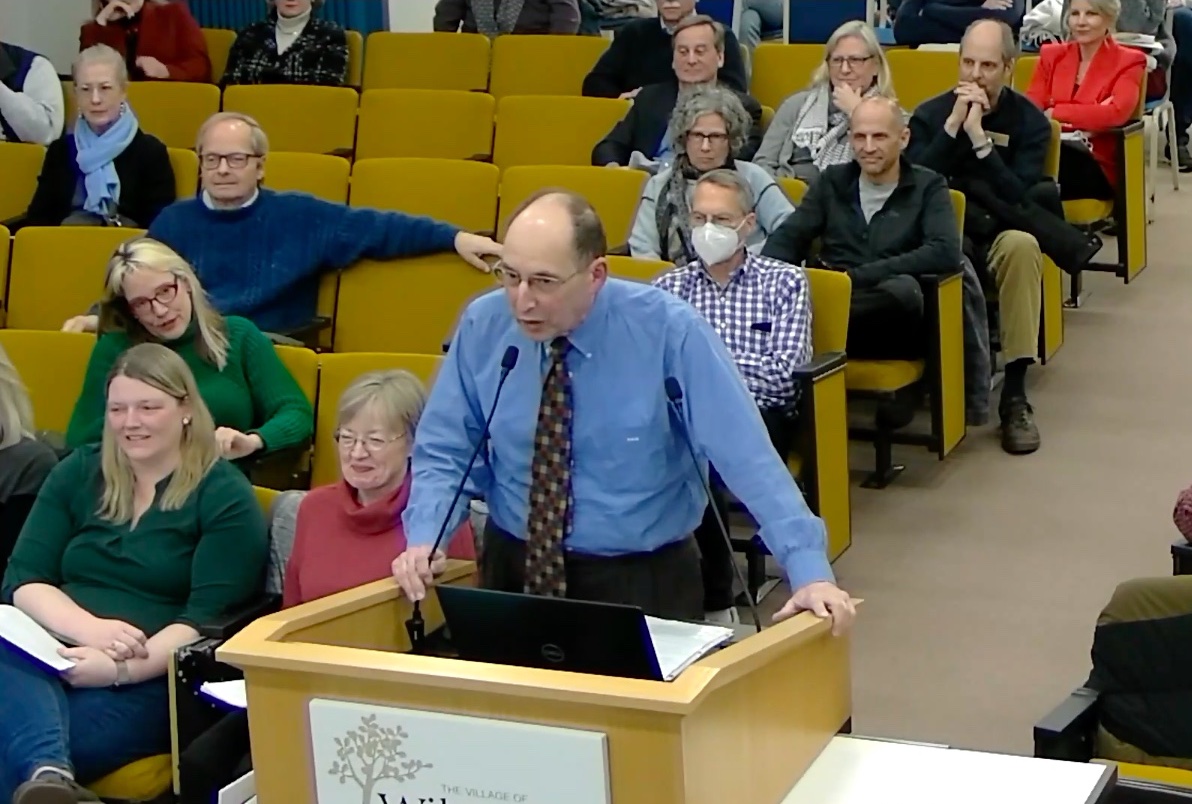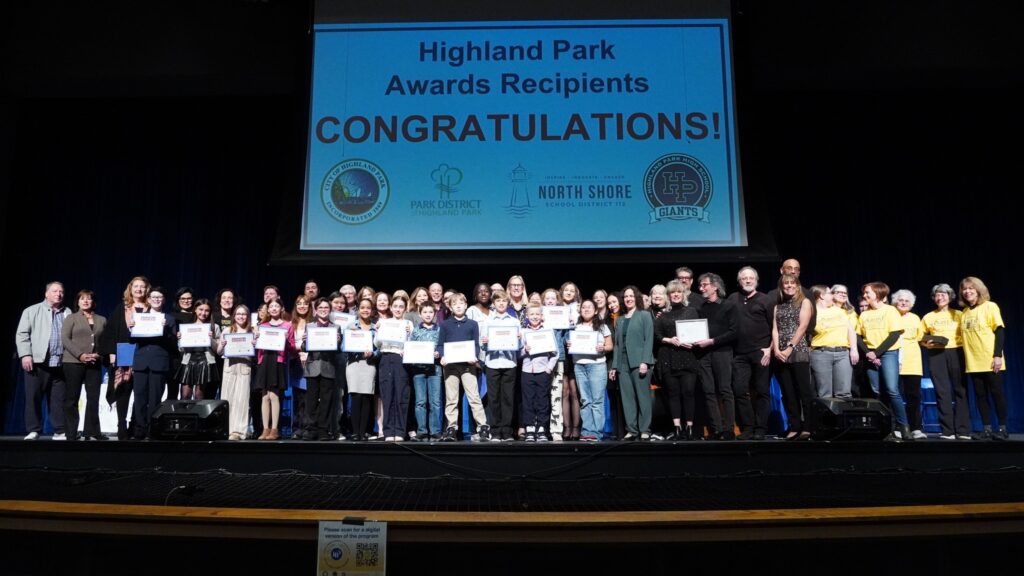
Wilmette residents want Village officials to keep fighting NU’s Ryan Field plan
Calls to contest Northwestern University’s plans to reimagine Ryan Field continue to echo throughout Wilmette weeks after Evanston officials narrowly greenlighted the university’s contentious proposal.
Nearly two dozen Wilmette residents addressed the Village Board during its Tuesday, Dec. 12 meeting, arguing that the Evanston school’s large-scale plans for Ryan Field will have wide-ranging adverse effects on the entire town.
Following the more than hour-long public testimony that opened the session, Wilmette Village President Senta Plunkett said that trustees would adjourn to executive session following the conclusion of the meeting to “consider all of our options and the timelines associated with those options.”
“The Village shares your concerns related to the impacts of concerts of Ryan Field on your neighborhoods and we agree that Northwestern has not satisfactorily addressed many of the concerns that you have raised this evening,” Plunkett said.
“I hope you can appreciate that it would be imprudent for the Village to discuss litigation strategy in a public meeting,” she added, noting that trustees would not return from the session to “discuss this publicly tonight” but that officials will “share more information with (residents) when it is appropriate to do so.”
Northwestern announced its intentions to build a new “world-class” venue that would host a limited number of concerts in the 35,000-person stadium in the fall of 2022, as previously reported by The Record.
The $800-million plan cuts stadium capacity by approximately 12,000 (from 47,000 to 35,000) but creates what the school describes as “more communal areas” and enables multiple revenue-generating concerts each year.
Since the inception of the school’s plans, Wilmette residents and elected officials have intensely fought the project, mainly Northwestern’s rezoning request to allow concerts at the new stadium that is just two blocks to the south of Wilmette’s border.
As The Record previously reported, a divided Evanston City Council offered its final approval of Northwestern’s divisive request to host concerts at a rebuilt Ryan Field in late November with a 5-4 vote.
Prior to the council’s approval, Evanston’s Land Use Commission voted to recommend approval of the university’s redevelopment plan but did not support concerts at the facility.
Days after approval from the City of Evanston, the Most Livable City Association, a group that has battled NU’s plans for Ryan Field, filed a lawsuit in the Circuit Court of Cook County that claims the City of Evanston violated local and state laws in its review of the university’s request, “harming residents and violating the public trust.”
Wilmette officials have expressed their displeasure around the project for over a year. But trustees took formal action in early August, approving a resolution objecting to what Plunkett described at the time as the “large-scale commercialization of Northwestern University’s Ryan Field.”
The resolution argued that the expansion will have “adverse impacts” on “more than 500 Wilmette households neighboring the campus.”
Many of the residents who spoke at the Dec. 12 meeting highlighted what they perceived as the adverse impacts of the concerts, detailing concerns about parking, safety, traffic management, pollution, noise levels, decreased property values and more.
Resident Steven Harper, who’s lived in Wilmette for more than three decades, said that “Evanston and Northwestern have backed Wilmette into a corner.” But Harper, and several of his fellow neighbors, encouraged trustees to “fight its way out.”
“Protection of our families and our homes is the most important reason that we pay taxes, whether it’s protection from crime, fire or a mortal attack by a neighboring city that no longer cares what it does to us for a billionaire’s buck.” Harper said. “We did not pick this fight but if you don’t fight back, your constituents will end up holding a very big bag and you will witness, in real time, the permanent destruction of a community.”
Phil Adams, who lives on 5th Street near Ryan Field, argued that Northwestern’s project will have an “important, significant impact on property values.” He also stated that it will affect all of Wilmette, not just the southern portion.
“Simply put, we’re a quiet neighborhood. We’re a quiet suburb,” he said. “Noise from concerts and the other ruckus events that are likely to occur with this zoning change will be terrible for southeast Wilmette and they’re going to travel far beyond southeast Wilmette.”
Resident Joab Oberlander told the board that he believes “Evanston and Northwestern want to turn this area into another Wrigleyville.” He urged the board for its support in helping residents fight the changes.
“People have built their lives in Wilmette,” he said. “It’s not a community of walls, iron fences, or barriers. One thing Northwestern and Evanston have made clear is that they don’t care about Wilmette. From a permanent reduction in the value of our homes to unlawful and dangerous noise pollution far exceeding our ordinance to keeping residents safe during their money-making concerts, they’re message has been clear: Wilmette you’re on your own. So we look to you for help.”
Plunkett concluded the discussion around Ryan Field by thanking residents for their advocacy on the issue over the past year.
“Please know that we empathize with you and the impacts the prospective concerts will have on you,” she said. “Your communication and your advocacy throughout this process has been helpful and informative to the village board, so thank you.”
Village Board tables vote on final conditions for Loyola’s lights
Wilmette trustees unanimously approved a motion on the meeting’s consent agenda to delay a decision on the final conditions that will be attached to a recently approved permit that grants Loyola Academy the right to install lights at Sachs Stadium on its Wilmette campus.
The board voted 6-1 in mid-November to approve Loyola’s request that will allow the private high school to install and operate permanent outdoor lights at its athletic stadium on the northeast corner of Lake and Laramie avenues.
Trustees’ approval came with several conditions attached that were preliminary reviewed in November and slated to be finalized at the Dec. 12 meeting.
But according to a village memo from Lisa Roberts, Wilmette’s deputy director of community development, “the final conditions of the draft ordinance are still being worked through” with Loyola and village staff. The school’s request is now set for final consideration at the board’s Jan. 9 meeting to “allow more time to review and prepare the conditions.”
As previously reported by The Record, the anchor of the school’s proposal is its plans to install four 80-foot light poles, two on each side of Hoerster Field, at Sachs Stadium
Trustees approve 2023 tax levy with near 3 percent increase
Wilmette residents will see a subtle increase in the Village-portion of their property tax bills next year due to a 2.94 percent increase in the town’s property tax levy.
The approved levy is expected to bring in $21.32 million, which is an increase of approximately $609,000 from the 2022 mark, according to village documents.
Homeowners in Wilmette should anticipate paying $88 more on average from the Village portion of their property-tax bill.
The majority of the funds in the levy, just under $11.5 million, are allocated toward the village’s general operating levy. Per village documents, the levy also includes $5.9 million for public safety pensions and $3.7 million for debt service.
Wilmette officials said the final 2.94 percent increase is significantly lower than the initial projected hike of 4.43 percent.
Property tax receipts are the largest source of revenue for the Village, and according to village documents, in 2024, it is expected to represent approximately 26 percent of all projected revenues.
The levy was approved via a 6-1 vote at the meeting, with Trustee Kathy Dodd casting the dissenting vote.
According to the minutes of the board’s Nov. 28 meeting, Dodd said she agrees with a significant portion of the budget but also believes that trustees and staff “need to be mindful of how expensive it is to live in Wilmette.”
Dodd added at the meeting that officials need to continue to look for ways to reduce the costs of living in the village, according to the minutes.
Dodd also expressed concern that it’s the first time in the last 15 years that a Village Board has allowed the general fund reserves to reach a 50 percent level (of operating expenses), also noting that three years ago the board committed to a policy to hold the reserves at a 30 percent level, the minutes say.
The Record is a nonprofit, nonpartisan community newsroom that relies on reader support to fuel its independent local journalism.
Become a member of The Record to fund responsible news coverage for your community.
Already a member? You can make a tax-deductible donation at any time.

Martin Carlino
Martin Carlino is a co-founder and the senior editor who assigns and edits The Record stories, while also bylining articles every week. Martin is an experienced and award-winning education reporter who was the editor of The Northbrook Tower.


